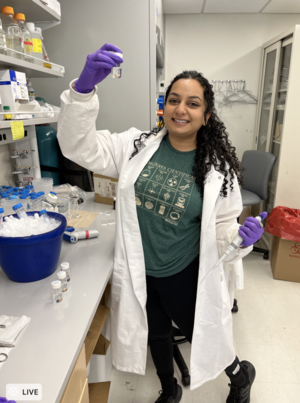
Spotlight in SWE
This segment seeks to spotlight a member of Yale SWE community and share their story.
This week, we are following Farrah Shalima Mohammed, a Co-Chair of the SWE Social Committee and a 4th year PhD student in the BME department. Her research focuses on using spatial transcriptomics to understand the molecular mechanisms of TBI and developing nanoparticle treatments for TBI-related edema.

What is it like to be a 4th year Ph.D. student?
Deep question! Like many students, I often find myself balancing my intersectionality while keeping focus on which battles to fight and keeping a strong but open mind. In my current position I believe I play a diverse role as a first-generation student, a Caribbean woman striving to put forth my best work but staying true to my values, a biologist-turned-engineer, a teaching assistant, and both a leader and learner in my role as a PhD Candidate in neural engineering. I enjoy the intellectual creativity, the challenges, and flexibility allowed in my field and by my PI Dr.Zhou where I am extremely lucky to be surrounded by inspirational women scientists and engineers who are experts in an array of fields from materials science to neuroscience. Most importantly, in my current position, I have been lucky to have built a strong foundation of support and mentorship. Even in the face of adversity, I believe I have a community to rely on.
What is your research topic?
Traumatic brain injuries are a leading cause of death and disability worldwide, especially affecting vulnerable populations such as victims of assault, people experiencing houselessness, and those involved in motor vehicle crashes. Broadly, I use pharmaceutical tools and spatial sequencing technology to understand the pathophysiology of traumatic brain injury. Using the controlled cortical impact model, I aim to uncover the transcriptomic patterns of the brain’s secondary response to traumatic brain injuries and uncover targets that can be used in the development of therapeutic nanoparticles.
Why a PhD in Engineering?
As an undergraduate, I completed my degree in Biology on the pre-medical track. While I excelled in my classes and enjoyed physics, math, and the sciences, I found myself looking forward to getting to the neural engineering lab I worked in more than shadowing. I enjoyed learning from the perspective of an engineer, and being a first-gen, I didn’t realize the diverse experience one can have as an engineer until I was exposed to this field. I spent a year on a Fulbright scholarship in Spain teaching science, and co-founded a student-run biomaterials company called Fungal making vegan leather! Although this is not related to the work I am passionate about now, I found, again, that I felt most fulfilled and passionate when struggling in the lab working towards an answer to the problems at hand. Some may call this a form of self torture. Though I would not disagree, I knew I found something that motivated me! I took a shot in the dark and applied to BME programs and the universe guided me here. I hope that I can use my training to make a difference in my field, have global scientific experiences, and encourage other URM to pursue STEM.
Inspiring moment in research?
The first time I had completed an experiment that had taken me months to plan out was one of the most inspiring moments I had. Like many graduate students, I definitely suffer from imposter syndrome. I am often filled with self-doubt and can tend to over-analyze each step, sometimes getting lost in the weeds. That experiment was the first time I believed I could be a good scientist, lead a team, and actually contribute to the scientific community. Sure it was but a small step in the whole process of experimentation, but sitting at my desk at 1 am after about 15 hours of experimentation, I was truly proud of myself, even if the data did not turn out how I hoped it would be. It was the first time I let myself feel accomplished.
Favorite book recommendation?
My favorite book is The World of Yesterday by Stefan Zweig. It’s a book that always reminds me that a peaceful world is never earned quickly. The delicate and smooth narrative gives a vivid description of daily life in Europe before world war I. Sometimes I feel it’s super difficult for women to make a living back to the 19th century, which always motivates me to do a little bit more to make the world a better one.
Any advice for younger women in STEM?
Related to science, I think every biomedical research scientist should read “Scrambling for Africa: AIDS, Expertise, and the Rise of American Global Health Science”. It is an eye opening take on how western societies take advantage of vulnerable populations to promote their own research interests and made me think about research ethics and the impact of colonization from a young age. A fun science read would probably be “Astrophysics for People in a Hurry”, it’s a quick fun read as astrophysics is a side passion of mine!